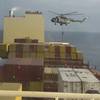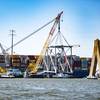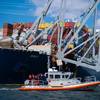Significantly more federal funding assistance is urgently needed for U.S. port security, testified port industry witness Noel Cunningham today at a hearing of the House Subcommittee on Coast Guard and Maritime Transportation. Representing the American Association of Port Authorities (AAPA) and the Ports of Los Angeles and Long Beach, Cunningham is Director of Operations and Emergency Management of the Port of Los Angeles, the largest container port in the U.S. and the seventh largest in the world.
“A healthy U.S. economy relies heavily on secure, functioning ports throughout the United States,” he said “Therefore, it is imperative that Congress make adequate seaport funding a priority.”
To illustrate the potentially dire economic consequences of a U.S. port closure, he pointed to the 10-day West Coast labor strike in 2002 that brought trade to an immediate halt and cost the U.S. economy a billion dollars a day.
Cunningham described the challenges ports have faced to comply with enhanced security requirements of the Maritime Transportation Security Act (MTSA), which was enacted after the tragic events of September 11, 2001. As mandated by the MTSA, the U.S. Coast Guard required all U.S. ports to submit security assessments and plans for review by December 31, 2003, with a July 1, 2004 deadline for implementation of the plans.
While ports have spent hundreds of millions of dollars on enhanced security measures since 9/11, Cunningham pointed out that the U.S. Coast Guard estimates ports will need to spend $5.4 billion over the next ten years to comply with the new MTSA requirements. He acknowledged that federal port security grants have provided assistance, but less than 20 percent of ports’ funding applications received grants in the first three rounds.
“For FY’05, the President requested only $46 million for the port security grant program, even though the Coast Guard estimates the first-year cost alone to comply with the MTSA will be $1.125 billion,” Cunningham said. “AAPA urges a FY’05 minimum of $400 million in port security grant funds.”
Cunningham asked the subcommittee to support legislation that will provide the badly needed funds for port security. Specifically, he voiced AAPA’s support of H.R. 3712, which authorizes a grant program within the Department of Homeland Security that calls for $800 million a year in grants over five years and
provides for multi-year funding to support long-range projects requiring more than a year to complete. Additionally, he said AAPA supports the concept of a dedicated source of funds, as proposed by H.R. 2193. It would dedicate a portion of the over $16 billion collected in annual Customs duties to fund port security needs.
Cunningham also encouraged support of initiatives that he described as critical to accomplishing robust security for U.S. ports, such as the following:
· The Transportation Worker Identification Credential (TWIC) program currently being pilot tested at a limited number of ports to serve as a uniform access-control system available to ports nationwide;
· Operation Safe Commerce, a pilot program combining technologies and processes to secure and track containers from their point of origin to their final destination; and
· the development of standards and a certification process for employee security training.
Sponsored Content
Chris-Marine’s solutions help to prolong engine lifetime

AST is now AST Networks, bringing you remote connectivity wherever you are

March 2024
 Read the Magazine
Read the Magazine

 Read the Magazine
Read the Magazine
This issue sponsored by:

Inland Waterways Focus: The Pacific Northwest Columbia-Snake River System
March 2024
 Read the Magazine
Read the Magazine

 Read the Magazine
Read the Magazine
This issue sponsored by:

GAO: Coast Guard Should Better Monitor its Efforts to Credential Merchant Mariners
Subscribe for
Maritime Reporter E-News
Maritime Reporter E-News is the maritime industry's largest circulation and most authoritative ENews Service, delivered to your Email five times per week










